What Type of Driveway Lasts the Longest? Asphalt, Chip Seal, Concrete & More
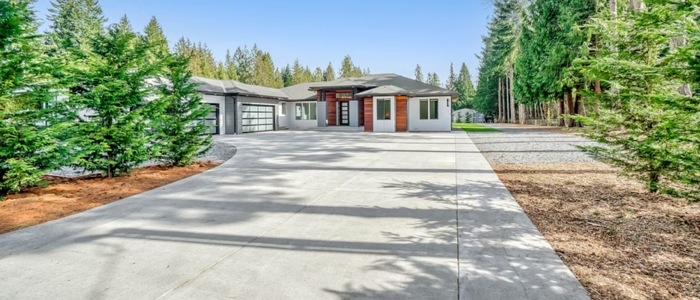
Is your driveway built to last, or is it cracking under pressure?
Choosing the right material can mean the difference between a smooth surface for decades and costly repairs in just a few short years.
So, what type of driveway lasts the longest?
In most climates, chip seal, asphalt, and concrete are among the most durable options, each with its own strengths in terms of lifespan, maintenance needs, and cost. Chip seal driveways, in particular, offer a strong balance of affordability, weather resistance, and low maintenance when applied correctly and maintained with proper chipseal driveway maintenance.
Read on as we compare the top five driveway types, break down what affects their longevity, and offer expert advice on choosing th e best surface for your property. Whether you’re a homeowner, business owner, or municipality, New England Asphalt is here to help you build smarter, and longer-lasting.
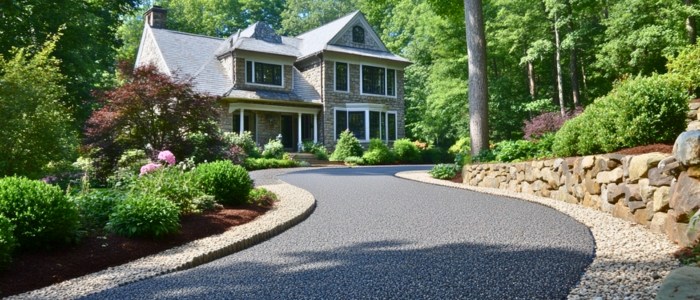
Key Factors That Influence Driveway Longevity
Climate and Weather Conditions
The durability of any driveway surface starts with how well it can handle your local climate. Freeze-thaw cycles, heavy rainfall, UV exposure, and temperature fluctuations all take a toll. In New England, where winters are harsh and summers can be humid, materials like chip seal and asphalt perform well due to their flexibility and resilience. These materials expand and contract with temperature changes better than rigid surfaces like concrete, which are more prone to cracking. Proper drainage and the use of weather-resistant driveways, with seal coating and surface treatments, are essential for extending service life.
For driveways in seasonal climates, chip seal paving is particularly effective due to its textured aggregate surface, which improves traction and sheds water efficiently.
Traffic Load and Usage
Another major factor is how much wear and tear your driveway experiences. Residential driveways used by only a few vehicles will have different demands than those servicing commercial, municipal, or industrial properties. Heavier traffic and frequent use accelerate surface degradation, especially if the driveway isn’t designed to handle that weight. For high-traffic areas, asphalt and chip seal driveways are excellent choices due to their compressive strength and ease of repair.
Explore New England Asphalt’s Commercial Services for solutions tailored to businesses and high-use properties.
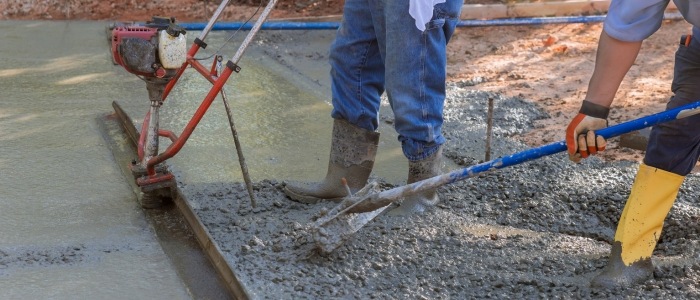
Quality of Installation and Materials
Even the most durable material will underperform if it’s poorly installed. Proper grading, base preparation, and the right aggregate binder are foundational to a long-lasting surface. For instance, chip seal requires a well-prepared base and precise application of both asphalt emulsion and stone aggregate to ensure maximum bond strength and longevity. New England Asphalt specializes in precision-based chip seal installation, ensuring surfaces that last with minimal upkeep.
Maintenance Frequency and Surface Treatments
Routine maintenance is what separates a driveway that fails in 10 years from one that lasts over 20. Techniques like seal coating, crack filling, and surface reapplications are essential to preserving both function and appearance. Chip seal and asphalt driveways, in particular, can be easily refreshed and restored without a full replacement, making them cost-effective paving choices in the long term.
For best results, schedule regular maintenance based on usage and seasonal wear to extend your driveway’s lifespan.
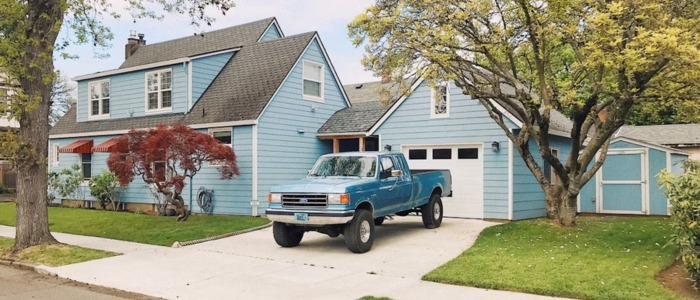
Concrete Driveways
- Average lifespan: 30–40 years with proper maintenance.
- Pros: Strong, rigid surface; minimal routine maintenance.
- Cons: High upfront cost; prone to cracking in freeze-thaw climates.
Concrete is often cited for its long lifespan, but in regions like New England, its rigidity can be a drawback. Without regular joint sealing and surface protection, cracks caused by temperature swings and moisture infiltration can shorten its service life significantly. While its clean look has aesthetic appeal, repairs are costly and usually require full section replacements.
Homeowners seeking a more flexible and cost-effective solution often turn to chip seal or asphalt, which hold up better under freeze-thaw stress.
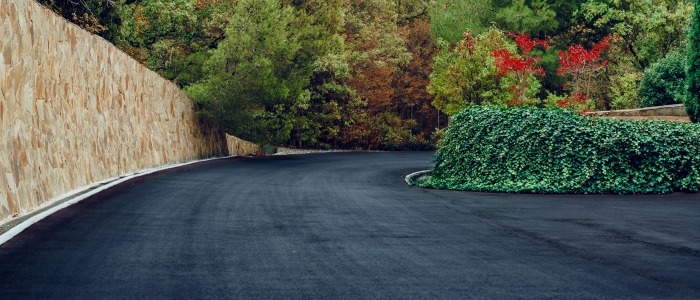
Asphalt Driveways
- Typical longevity: 20–30 years with maintenance.
- Strengths: Flexible, affordable, easy to maintain.
- Maintenance: Requires seal coating, crack filling, and periodic resurfacing.
Asphalt remains a popular choice thanks to its balance of durability and low cost. It can handle moderate to heavy vehicle loads and performs well in colder climates if maintained regularly. The key to maximizing asphalt driveway longevity lies in protecting it from water intrusion and UV damage. With routine care, including resurfacing every 10–15 years, asphalt can be one of the most cost-effective paving options.
See how chip seal compares to asphalt if you’re deciding between the two.
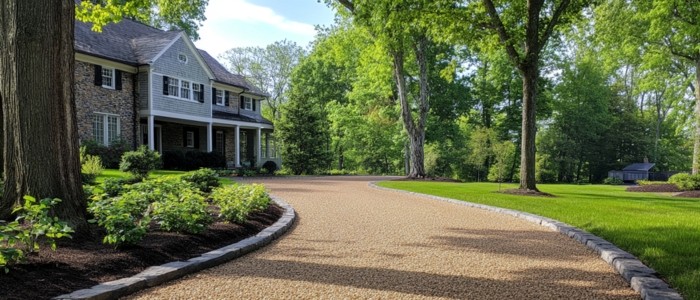
Chip Seal Driveways
- Estimated lifespan: 10–20 years (often longer with resurfacing).
- Advantages: Superior weather resistance, excellent drainage, strong aesthetic appeal, and eco-friendly paving.
A chip seal driveway is made by applying a layer of asphalt emulsion followed by a layer of crushed stone aggregate, creating a textured, durable surface. Especially well-suited for New England conditions, chip seal is flexible like asphalt but adds a layer of protection and natural stone charm. It’s also budget-conscious, as it can be refreshed every 7–10 years with a new application.
Explore the benefits of chip seal paving and how long it really lasts in this in-depth guide.

Gravel Driveways
- Lifespan: Indefinite with frequent upkeep.
- Pros: Low installation cost.
- Cons: High maintenance; prone to washouts, ruts, and loose material.
While gravel is inexpensive to install, it requires regular grading, reapplication, and weed control. Without a stabilizing binder or surface treatment, it’s susceptible to erosion and can become unsightly over time. It may suit rural or secondary access roads, but for primary driveways, it lacks the long-lasting driveway value found in chip seal or asphalt.

Paver or Brick Driveways
- Expected lifespan: 40+ years with proper installation.
- Strengths: Elegant aesthetics, high durability.
- Drawbacks: Expensive to install and repair; susceptible to weed growth and shifting if not sealed or maintained.
Paver driveways are among the most visually appealing and longest-lasting when installed with a stable base. However, they come at a high cost and can require frequent attention to maintain a level surface. Their use is typically reserved for decorative or upscale applications.
Thinking About a New Chip Seal Driveway?
Request a Free Quote
Our team is ready to help you create a durable, beautiful surface that stands the test of time. Contact us today to learn more.
Driveway Longevity & Value Comparison
| Driveway Type | Lifespan | Pros | Cons |
| Chip Seal | 10–20+ years | – Affordable to install and maintain- Moderate maintenance (resurfacing every 7–10 years)- Excellent weather resistance and traction- Eco-friendly surface treatment option | – Slightly rougher texture than asphalt or concrete- Requires regular resurfacing for optimal longevity |
| Asphalt | 20–30 years | – Moderately priced installation- Easily repairable- Flexible material performs well in cold climates | – Moderate to high maintenance (seal coating every 3–5 years, crack filling)- Surface may degrade without consistent care |
| Concrete | 30–40 years | – Low maintenance needs once installed- Long lifespan in stable climates- Smooth, clean surface finish | – Expensive initial installation cost- Prone to cracking in freeze-thaw environments- Repairs are difficult and often costly |
| Gravel | Indefinite (with care) | – Very affordable to install- Simple to maintain with basic tools | – High maintenance (frequent grading, material replenishment, weed control)- Poor durability in heavy-use areas- Low visual appeal |
| Paver/Brick | 40+ years | – Extremely durable with proper base- Attractive, upscale appearance- Moderate maintenance if sealed | – Very expensive to install- Labor-intensive to repair uneven sections- Susceptible to weed growth if not maintained |
Tip: For a surface that combines value, durability, and minimal upkeep in New England, consider chip seal driveways as a top contender.
Maintenance and Surface Treatments to Extend Lifespan
Proper maintenance isn’t just a recommendation, it’s essential for ensuring that any driveway reaches its full potential lifespan. Whether you’ve chosen asphalt, chip seal, concrete, or pavers, the right surface treatments can significantly delay deterioration, enhance appearance, and protect your investment long-term.
Seal Coating Benefits
For both asphalt and chip seal driveways, seal coating serves as a protective barrier against moisture, UV damage, and chemicals like oil or gasoline. Applied every 3–5 years, seal coat restores a rich surface color and prevents small cracks from expanding into larger issues. It’s one of the most cost-effective ways to preserve asphalt driveway longevity and is recommended as a standard part of chip seal driveway maintenance.
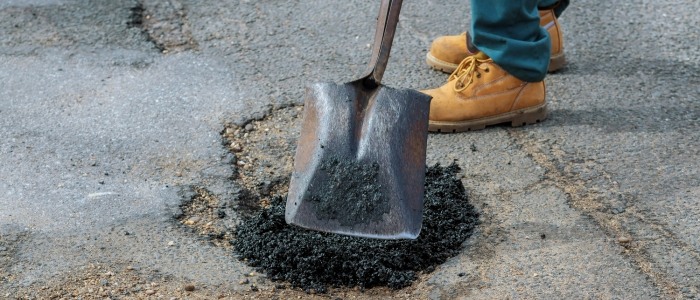
Crack Filling and Patching
Small cracks inevitably form over time, especially in cold climates with frequent freeze-thaw cycles. Left untreated, they widen and allow water to infiltrate the base, undermining the structure. Routine crack filling and targeted patching are critical, particularly for asphalt and concrete. For chip seal surfaces, early resealing or resurfacing with additional aggregate can mitigate cracking and maintain surface integrity.
Surface Restoration and Reapplication
One advantage of both chip seal and asphalt is that they can be restored without full replacement. Chip seal resurfacing involves applying a fresh layer of emulsion and stone, extending the life of the surface by another 7–10 years. Asphalt can also be resurfaced or overlaid, offering renewed performance at a fraction of the cost of a full replacement.
Learn how this works in our guide on How Chip Seal Paving Works.
Drainage Management
Drainage is often overlooked, but poor water flow can drastically shorten a driveway’s lifespan. Water pooling leads to erosion, base weakening, and freeze damage. Proper slope, grading, and drainage installation during the initial driveway installation are essential, especially for chip seal and gravel driveways. For existing surfaces, correcting drainage issues early can prevent costly damage.
Expert Recommendations
When choosing the best driveway material for longevity, cost-efficiency, and durability, it’s essential to consider your environment and long-term maintenance plans. In the New England climate, where freeze-thaw cycles, snow, and seasonal rain are the norm, flexible, weather-resistant surfaces like chip seal and asphalt consistently outperform more rigid options like concrete.
If you’re looking for a cost-effective paving solution that performs well in harsh climates while offering a natural stone aesthetic, chip seal driveways are a smart, sustainable choice. With routine maintenance, including resurfacing and seal coating, they can last just as long as asphalt, at a lower cost and with better traction.
For commercial, industrial, or municipal applications, New England Asphalt also offers tailored solutions to suit heavier loads and higher-traffic environments. Explore options designed for your sector:
No matter your needs, the key to long-lasting results lies in professional installation, proper site preparation, and scheduled maintenance, services New England Asphalt has specialized in for decades.
Frequently Asked Questions (FAQs)
A well-installed chip seal driveway typically lasts 7 to 10 years, depending on traffic volume, weather conditions, and how well it’s maintained. Some sources report slightly shorter spans of 5–8 years before resurfacing is necessary, especially in high-traffic or extreme climate areas. However, with regular maintenance and resurfacing, many chip seal surfaces can exceed this range and remain in excellent condition.
Concrete driveways generally have a longer lifespan, lasting 30 to 40 years or more when properly installed and maintained. In contrast, asphalt driveways typically last 20 to 30 years, provided they receive routine seal coating, crack filling, and occasional resurfacing. While concrete offers greater longevity, asphalt provides easier and more affordable maintenance.
Yes, resurfacing is often a smart and cost-effective alternative to full replacement. Asphalt and chip seal driveways can both be refreshed through resurfacing methods. For chip seal, this involves applying a new layer of asphalt emulsion and aggregate, extending the life of the surface by years. Learn more about the process here. Asphalt can also be restored with overlays or milling, reducing costs and downtime compared to full removal and replacement.
Thinking About a New Chip Seal Driveway?
Request a Free Quote
Our team is ready to help you create a durable, beautiful surface that stands the test of time. Contact us today to learn more.
Conclusion
So, what type of driveway lasts the longest? The answer depends on the balance you’re seeking between initial cost, aesthetic preference, maintenance commitment, and local climate conditions.
- Choose a chip seal for a durable, affordable surface that’s ideal for New England conditions and can be refreshed for decades.
- Opt for asphalt if you’re looking for flexibility, easy repairs, and moderate upfront cost.
- Go with concrete if longevity and a clean finish are worth the higher price and repair limitations.
- Consider pavers for premium aesthetics, or gravel if you need a basic, budget-friendly solution with higher upkeep.
Whatever your choice, make sure it’s installed by professionals who understand the local environment and are committed to delivering long-term value.
Ready to get started or want expert input on your driveway project? Contact New England Asphalt today for a consultation, and discover how we help driveways, and investments, last longer.



